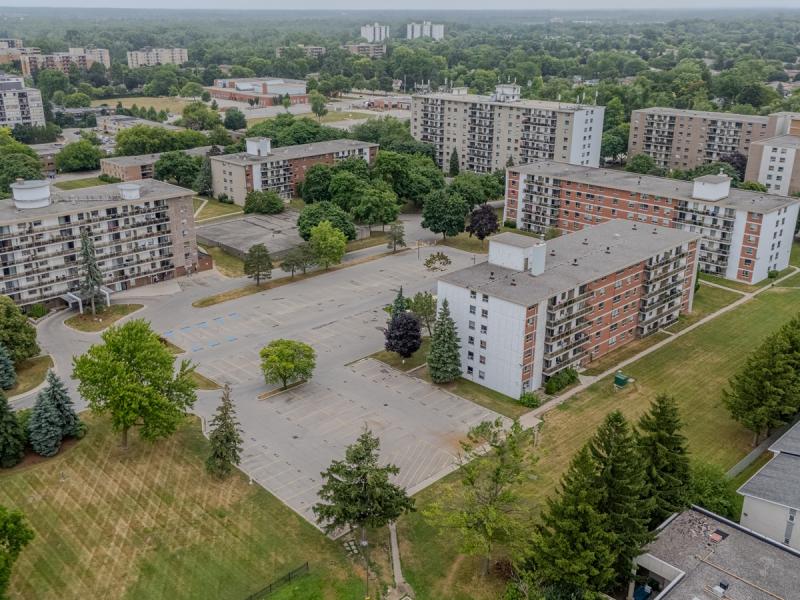
Early results to a survey by SVN Rock Advisors indicates 73 per cent of apartment residents were able to make their rents on April 1 and that number is expected to rise as more data flows in. (Google Street View)
Seventy-three per cent of apartment tenants paid their rent for April 1, a number expected to rise as more results come in, according to a survey by SVN Rock Advisors Inc., Brokerage.
The Burlington-based company had more than 150 responses from building owners and managers as of April 3. About half of the respondents provided more granular insight into the situations with their tenants in this new COVID-19 environment.
The survey results were released during an April 3 webinar hosted by CEO Derek Lobo and viewed by more than 1,000.
“Apartments are recession-proof, but they’re not virus-proof,” said Lobo, who advised landlords should expect some short-term pain. “Here’s what I’m hearing: ‘Nothing horrible’, ‘pleasantly surprised’, ‘not as bad as I thought’.”
Less than one per cent of apartment tenants reached out to landlords saying they were having issues paying rent. Lobo believes many people are embarrassed about their inability to pay and that’s why they didn’t come forward early to discuss it.
Rent payment survey results
According to the survey, which remains available on the SVN Rock Advisors website, 74 per cent of tenants paid in pre-1960s buildings, 71 per cent paid in buildings constructed from 1960-’89, and 55 per cent paid in buildings constructed in or after 1990.
* Bachelor units with an average rent of $967 collected rent from 83 per cent of tenants.
* One-bedroom units with an average rent of $1,073 collected rents from 89 per cent of tenants.
* Two-bedroom units with an average rent of $1,345 collected rent from 83 per cent of tenants.
* Three-bedroom units with an average rent of $1,535 collected rents from 88 per cent of tenants.
Institutional-sized owners of approximately 12,000 units, in upscale buildings with a large number of seniors and about 75 per cent of tenants using pre-approved payment plans, reported a 95 per cent collection rate.
“When we got more granular, the data showed a higher percentage,” Lobo explained. “What I’m concluding is that if your tenants paid you 73 per cent, you were depressed and didn’t go on to fill in the survey. If they paid you 83 per cent, you were a little happier and went on to fill out the survey.”
Units with lower monthly rents appear to have been most affected. Lobo said people living in smaller units and paying less rent likely have less savings and are more at risk of not paying.
What’s been learned so far
Lobo emphasized rental apartment industry fundamentals in Canada remain the same: a shortage of rental product; little prospect of a new and affordable supply; low turnover rates; and a gap between in-place and potential market rents.
Lobo pointed out the loss of a single tenant can be catastrophic in other asset classes, but not for apartments.
In reviewing the survey results, Lobo came up with these key takeaways:
* Most tenants who can pay have paid.
* It’s important to call tenants ahead of their rent payment date and maintain regular and open communication.
* Defaults were lower than expected and largely originated from apartments with lower price points, but will compound by May 1.
* Some tenants are offering to pay partial rent, rather than pay nothing.
* A small percentage of tenants with post-dated cheques requested rents to be deferred. There may be a higher number of cheques returned for non-sufficient funds this month.
Blanket policies vs. one-on-one approaches
While some large landlords owning thousands of units have created blanket rules regarding rent payments because they have too much volume to deal with tenants on an individual basis, Lobo recommended owners of fewer than 1,000 units attempt to develop more personal relationships with tenants.
“This is an opportunity to take your service level and your brand up, not down,” said Lobo.
Lobo cited the example of Irvine Company in the United States, which owns about 60,000 units – far too many to deal with on an individual basis.
It came up with this blanket policy: Renters unable to pay rent due to health or financial hardship can pay 50 per cent of their April and May rents, which is to be paid back interest-free over six months.
Blanket policies should require notes from doctors or employers, as well as pay stubs and bank statements, to prove the tenant’s financial hardship.
Next steps to take
It was recommended landlords determine which tenants are most likely to be directly affected and reach out to them.
This involves going through rent rolls and looking at their applications and current resident profiles, including payment history, employer, income and size of household.
Lobo said these important phone calls should be made by the property or leasing manager and not front-line staff.
“Your tone should always be neutral and sympathetic,” said Lobo. “This is not the right time to play hardball.”
Even more senior people should make calls where there’s a bigger non-payment issue or potential hostility.
SVN Rock Advisors has created a script template for these calls which can be downloaded from its website. It includes the presentation of a deferred payment plan option.
Lobo recommended asking for evidence of employment interruption from tenants and to document the deferred payment plan so both parties have copies.
Tenants on deferred payment plans should have their leases extended though that payment period as part of the negotiation so they can’t move out when they still owe money.
Avoid extending leases so they end in December or January because units are generally harder to rent during those months.
Long-term tenants aren’t likely to leave, even if they can’t pay their rent, because they’re paying well below market rent.
Lobo said to consider these as rent deferrals, because they’ll probably catch up with payments once the economy improves.
Lobo also suggested getting post-dated cheques for payments. If the tenant can’t pay, the date on the cheque can be changed if initialed by the tenant.
A temporary solution for a tenant with a short-term cash crunch is giving the option of paying rent by credit card. Due to high interest rates involved, though, this isn’t advised for more than a month or two.
Tenants who can pay their rent before May 1 could be offered an incentive as a token of appreciation, Lobo suggested.
How building operations could be affected
Lobo also received advice on building operations from appraiser Sandy Mandel of Sanford Mandel & Associates Inc.:
* rental traffic is going to be reduced and any vacancies will take longer to rent;
* previously expected rent levels may be compromised and rents aren’t going to go up during this period;
* bad debt can be expected to increase;
* utility consumption, particularly water, will increase for the duration of this crisis because more people are at home during the day;
* the customary spring and student tenant rush might not happen.
Student housing will be a “wild card”
Lobo said student housing will be a “wild card” because leases generally go from May to May and from September to September.
“If you haven’t got your May-to-May leases done, you’re probably going to be vacant for the summer. If things come back to normal in two or three months, you’ll probably be OK for September to pick up your September-to-September leases.”
Lobo believes better quality student buildings with bed and bathroom parity will perform better due to residual uneasiness about sharing which is being created by the COVID-19 pandemic.
Next webinar and online courses
SVN Rock Advisors will hold the fifth, and likely final, webinar in this series April 9 at 10:30 a.m. EST. It will deal with more robust survey data, analysis and follow-up strategies looking ahead to May 1.
SVN Rock Advisors has video-recorded 60 seminars, with accompanying scripts and slides, that it has held over the years.
It will launch “New Apartment Construction Developer University” online on April 14 in order to provide information on steps to be taken in new apartment construction so people are ready to move forward when the COVID-19 crisis ends.
“For some of you, there are extraordinary opportunities to develop apartments,” said Lobo.
“We’re going to bounce back way better than most businesses once the economy rights itself, which we hope will be in a short amount of time.”







